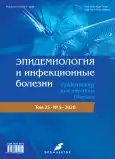The autochthonous cases of acute opisthorchiasis in the Moscow region
- Authors: Bronstein A.M.1,2, Burova S.V.3, Malishev N.A.4, Davidova I.5
-
Affiliations:
- The Russian National Research Medical University named after N.I. Pirogov
- Infectious Clinical Hospital N 1
- Pigorov Russian National Research Medical University
- Moscow State University of Medicine and Dentistry named after A.I. Evdokimov
- Moscow State Medical Stomatological University
- Issue: Vol 25, No 5 (2020)
- Pages: 228-232
- Section: CASE REPORTS
- URL: https://bakhtiniada.ru/1560-9529/article/view/64211
- DOI: https://doi.org/10.17816/EID64211
- ID: 64211
Cite item
Full Text
Abstract
Acute stages of parasitic diseases are rare diagnosed and therefore, clinicians have limited knowledge of their clinical features. We describe five autochtnonous acute cases of opisthorchiasis in Moscow region acquired from eating raw ides (L. idus). The most frequent clinical symptoms were febrile, eosinophilic syndrome with cholestasis. The patients were positive for IgG antibodies to Opisthorchis felineus. Eggs of O. felineus were found in one patient. As egg production O. felineus starts 1 month after exposure and opisthorchiasis cases in Moscow region have low numbers of worms, the sensitivity of microscopy is low. Therefore we consider opisthorchiasis in all patients of unexplained acute fever, pain in upper right abdominal quadrant, and eosinophilia with cholestasis, when patients confirm the ingestion of raw fish. We recommend one day of praziquantel 25 mg/kg TID to patients infected with O. felineus. In previous publications describing the autochtnonous cases of opisthorchiasis in Moscow region the authors supposed that cases of local infection will be found again in Moscow region and this is just a matter of time. The cases reported here confirm that this infection is endemic in Moscow region. The local people living close to rivers especially those who eat raw fish are at risk of infection O. felineus. There is a clear need to undertake special studies pertaining to the ways of promoting people living in Moscow region become aware of opisthorchiasis and to be motivated in preventive measures and treatment.
Full Text
##article.viewOnOriginalSite##About the authors
Alexandr M. Bronstein
The Russian National Research Medical University named after N.I. Pirogov; Infectious Clinical Hospital N 1
Email: bronstein@mail.ru
ORCID iD: 0000-0003-2860-4466
SPIN-code: 3693-6783
MD, Dr. Sci. (Med.), Professor, Department of Infectious Diseases and Epidemiology
Russian Federation, 119121, Moscow, Ostrovityaninova St., 1; 125367 Moscow, Volokolamskoe Sh.,63
Svetlana V. Burova
Pigorov Russian National Research Medical University
Email: svburova@list.ru
ORCID iD: 0000-0001-7664-7685
SPIN-code: 9165-2625
PhD, Department of Infectious Diseases and Epidemiology
Russian Federation, 1, Ostrovityaninova St., Moscow, 119121Nikolay A. Malishev
Moscow State University of Medicine and Dentistry named after A.I. Evdokimov
Email: manicola@yandex.ru
SPIN-code: 4654-0211
Scopus Author ID: 91550
MD, Dr. Sci. (Med.), Professor, Department of Infectious Diseases and Epidemiology
Russian Federation, 20/1, st. Delegatskaya, Moscow, 127473Irina Davidova
Moscow State Medical Stomatological University
Author for correspondence.
Email: leenok@mail.ru
ORCID iD: 0000-0003-1457-485X
SPIN-code: 3458-5714
Department of Infectious Diseases and Epidemiology
Russian Federation, 20/1, st. Delegatskaya, Moscow, 127473References
- Bronstein AM, Maximova MS, Fedyanina LV, et al. Liver flukes: algorithm of diagnosis and treatment. Analysis of cases and review. Epidemiology and Infectious Diseases. 2019;24(1):43–48. (In Russ). doi: 10.18821/1560-9529-2019-24-1-43-48
- Control of foodborne trematode infections. N 849. WHO Techn Rep Ser; 1995. 157 p.
- Petney TN, Andrews RH, Saijuntha W, et al. The zoonotic, fish-borne liver flukes Clonorchis sinensis, Opisthorchis felineus and Opisthorchis viverrini. Int J Parasitol. 2013;43(12-13):1031–1046. doi: 10.1016/j.ijpara.2013.07.007
- Pozio E, Armignacco O, Ferri F, Gomez Morales MA. Opisthorchis felineus, an emerging infection in Italy and its implication for the European Union. Acta Trop. 2013;126(1):54–62. doi: 10.1016/j.actatropica.2013.01.005
- Traverso A, Repetto E, Magnani S, et al. A large outbreak of Opisthorchis felineus in Italy suggests that opisthorchiasis develops as a febrile eosinophilic syndrome with cholestasis rather than a hepatitis-like syndrom. Eur J Clin Microbiol Infect Dis. 2012;31(6):1089–1093. doi: 10.1007/s10096-011-1411-y
- Armignacco O, Caterini L, Marucci G, et al. Human illnesses caused by Opisthorchis felineus flukes, Italy. Emerg Infect Dis. 2008;14(12):1902–1905. doi: 10.3201/eid1412.080782
- Bronstein AM. An analysis of opisthorchiasis and diphyllobotriasis age prevalence among native population in the Kyshik settlement of the Khanty-Mansi autonomous region. Medical Parasitology and Parasitic Diseases. 1986;(3):44–48. (In Russ).
- Fedorova OS, Fedotova MM, Sokolova TS, et al. Opisthorchis felineus infection prevalence in Western Siberia: a review of Russian literature. Acta Trop. 2018;178:196–204. doi: 10.1016/j.actatropica
- Federal Service for Supervision of Consumer Rights Protection and Human Well-being. About the situation with human infection with parasites through fish [05.10.2015]. (In Russ). Available from: https://www.rospotrebnadzor.ru/about/info/news/news_details.php?ELEMENT_ID=4371
- Bronstein AM, Beer SA. Opisthorchiasis in the Moscow and Vladimir regions. Medical Parasitology and Parasitic Diseases. 1988;(6):46–49. (In Russ).
- Bronstein AM, Kozlov SS, Malyshev NA, et al. Аcute infection of Opisthorchis felineus in Moscow: cases from delivered fish and cases in tourists travelled to endemic regions in Russia. Jurnal Infektologii. 2019;11(1):76–73. (In Russ). doi: 10.22625/2072-6732-2019-11-1-76-83
- Bronstein AM, Lukashev AN. Possible case of trichinellosis associated with beaver (Castor fiber) meat. J Helminthol. 2019;93(3):372–374. doi: 10.1017/S0022149X18000342
- Bronstein AM, Fedyanina LV, Maximova MS, et al. Nine cases of human dipylidiasis in Moscow region during 1987 to 2017. Trop Biomed. 2020;37(1):194–200.
- Bronstein AM, Lukashev AN, Maximova MS, Sacharova TV. The autochthonous cases of acute strongyloidiasis in the Moscow region. Germs. 2021;11(1):116–119.
- Kozlov SS. Methods of laboratory diagnosis of intestinal parasitosis. The pros and cons. Russian Clinical Laboratory Diagnostics. 2016;61(9):624–625. (In Russ).
Supplementary files






